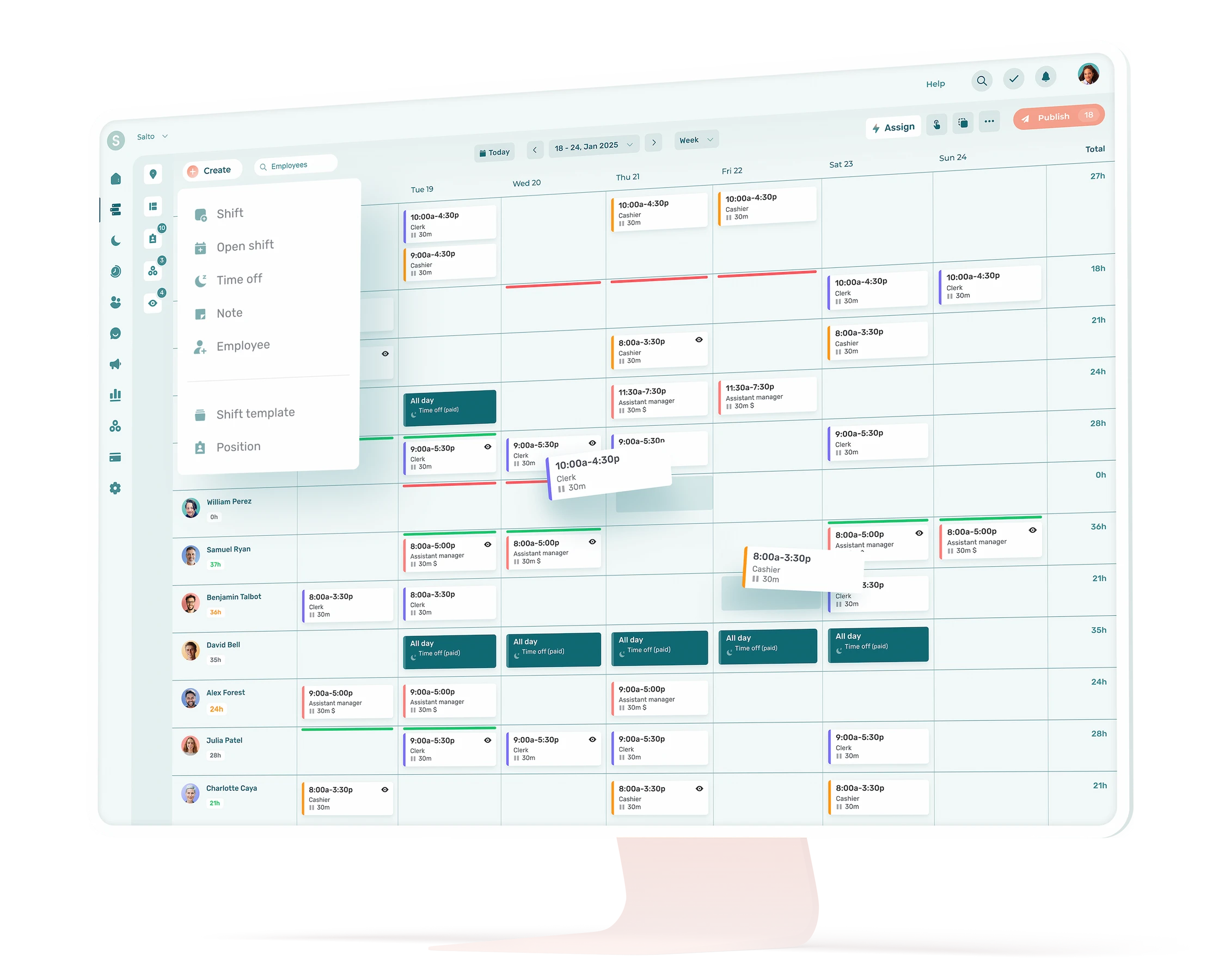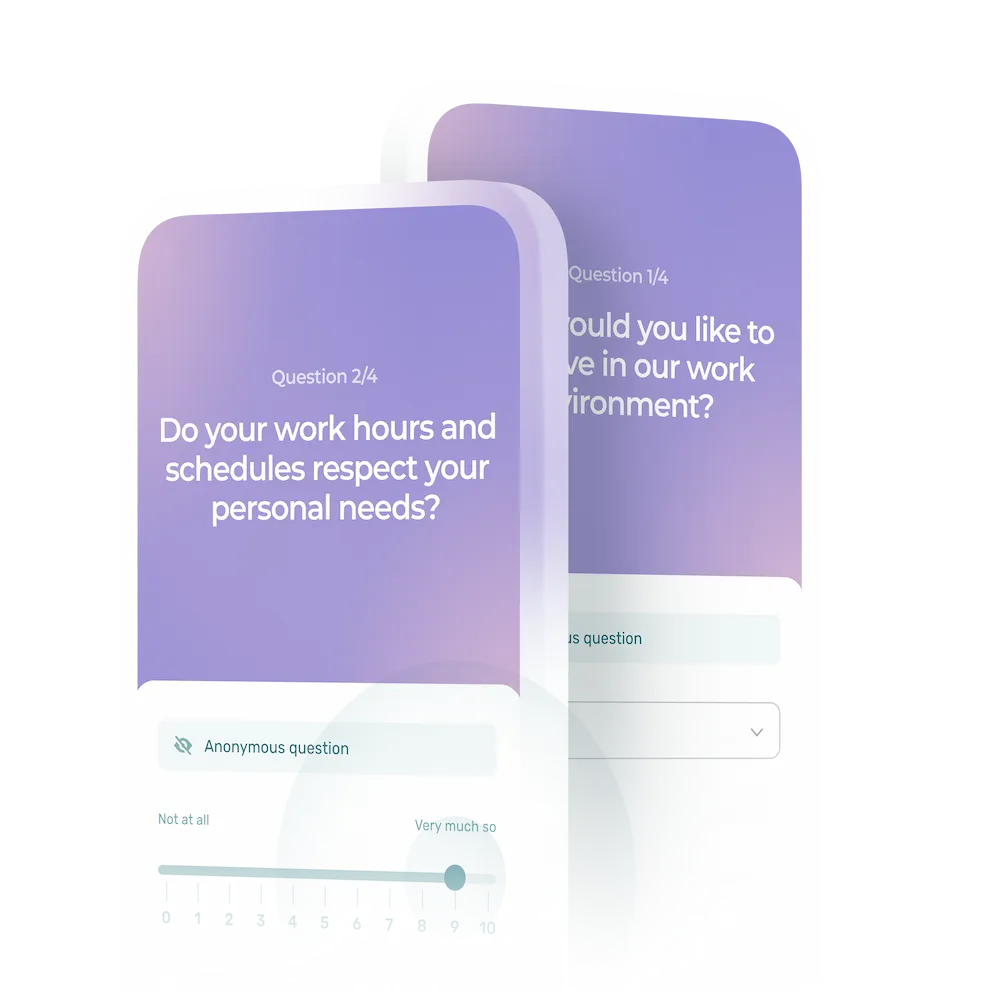When you think of the word “leader,” what qualities or skills come to mind?
To me, a leader is someone who inspires by their ability to rally and motivate people. They’re not necessarily managers, although good managers often are good leaders. Leadership is a combination of skills, competencies and knowledge that allow someone to lead teams and achieve common goals.
How then does one become a leader? Some will tell you that it comes naturally; others, that nothing beats experience on the work market. One thing’s for sure, however: leadership can be worked on.
In short, here are our top tips for becoming a leader at work:
- Show empathy
- Ask for your colleagues’ opinions
- Say “thank you” more often
- Get involved
- Lead by example
- Keep your cool
- Learn to better communicate
- Listen carefully
- Show openness
- Develop your confidence
- Work on your humility
- Learn to delegate
- Set your boundaries
- Acknowledge your strengths and weaknesses
- Maintain your network
- Have fun
- Play the long game
- Don’t give after failing once
- Surround yourself with diverse people
- Develop and share your knowledge
- Rely on feedback
What Is Effective Leadership?
Effective leadership is a person’s ability to effectively influence the people around them to achieve certain goals. In a company, this includes both team members and other stakeholders in the organization. A manager who practices effective leadership will be able to influence employees to go beyond expectations.
Leader vs. Manager
A leader is not necessarily a manager, and a manager is not necessarily a leader. But how do they differ?
A leader is totally committed to their team. They are proactive, innovative and creative on a daily basis. They inspire their team members, but don’t tell them what to do. They want to achieve objectives so that everyone benefits from the positive outcomes and progresses in their careers.
They demonstrate many leadership skills, such as authenticity, innovation, listening, empathy and so on. They are good leaders both at work and in their personal lives.
A manager makes sure that the rules in place are respected and that each employee knows their responsibilities and tasks. They are respected by their team members and their decisions are not open to question. They want to achieve objectives to advance their personal career.
They are able to lead a team, but do not necessarily demonstrate day-to-day leadership. Their skills are exclusively work-related.
Leader vs. Boss
What are the differences between a boss and a leader?
The most striking differences are in the way they express themselves. A leader speaks as “we”, mentors team members, recognizes teamwork and motivates employees to give their best.
A leader acts and speaks as an integral member of the team. They take pride in everyone’s success and don’t take all the credit for the work accomplished.
A boss speaks in “I” tones, is authoritative and can even inspire fear. They tend to take credit rather than give it to their employees.
A boss acts as if the company’s success is entirely their own. They give little or no recognition to the work of their employees.
8 Characteristics of Effective Leaders
Effective leaders are the most successful. They optimize their strengths to inspire and motivate others to achieve common goals.
Effective leaders share many characteristics, such as:
- They inspire trust
- They demonstrate compassion and empathy
- They are always there when needed and demonstrate mental toughness
- They inspire others to give their best in the hope of a better future
- They contribute to the professional development of their colleagues
- They communicate transparently and clearly
- They know that failure is part of the adventure
- They listen to others
4 Most Effective Leadership Styles
There are a myriad of leadership styles. However, some are typically more effective than others.
Here are a few examples of the most effective leadership styles:
- The democratic leader: takes into account and values the opinions of all team members.
- The strategic leader: guides team members towards long-term goals with a clear vision.
- The mentor leader: helps team members develop their full potential.
- The visionary leader: encourages innovation, is not afraid of failure, and embraces change within the organization.
How to Find Your Leadership Style?
Everyone’s leadership style is unique. It’s influenced by your personality, goals, ambitions, preferences and so on.
To determine your personal leadership style, you may decide to take an online test to help you better identify your natural preferences and understand your personality type. You can also ask for the help of a mentor who knows you well, or simply do some introspection.
The truth is, the best way to find your leadership style is probably through trial and error over time. Necessarily, your leadership style may also evolve with your experience and background.
To help you better understand your leadership style, here are some questions to explore:
- Why do you want to be a leader?
- What are your strengths as a leader?
- What are your weaknesses as a leader?
- How do you influence others?
- How do you maintain strong relationships?
- How do you achieve your goals?
- What’s your favorite way of analyzing a situation?
- What are your values?
21 Tips to Help You Develop Your Leadership Skills
Becoming a better leader takes hard work. But you can do it by applying a few simple tricks every day. The more you practice leadership, the better you’ll become.
Here are 21 tips to help you develop your leadership skills and become a better leader in the workplace.
1. Show Empathy
A leader cares about their team’s well-being and shows empathy. They are understanding when an employee underperforms due to fatigue or has trouble doing their work. They also understand that people’s personal lives have an impact at work. Many factors, big and small, can affect an employee’s productivity—insufficient sleep, conflicts at home, financial trouble, etc.
Ask your employees how they are doing and adapt your management methods accordingly. See if you can help someone who appears to need it. Ultimately, your team will know you’re there for them, and that they’re not just numbers to you.
2. Ask for Your Colleagues’ Opinions
True leaders always work with their team. Make it a habit to consult your colleagues. Imagine all the things you’re missing by not having your team weigh in. Your colleagues have a ton of knowledge and experience. Leverage it.
Consulting employees more often will tell them that you acknowledge their skills, and will ultimately result in them being more engaged in their work. Acknowledgement is a great motivator!
3. Say “Thank You” More Often
Acknowledging employees’ work is an important habit to take up to become a leader. Start by thanking them more often. It’s a small gesture that can make a great difference for many.
4. Do It Yourself
What is the difference between a leader and a boss?
A boss merely gives out orders and allocates tasks. A leader guides their team in the pursuit of common goals. They don’t hesitate to roll up their sleeves and join in the work when necessary.
A leader without a team is no leader at all. Put your team front and centre by making sure you’re always there when they need you.
5. Lead by Example
Leaders endeavour to do their best and step up to the plate to reach their goals. If your employees see you always give your 100%, they’ll tend to do the same.
Inspire your team by leading by example, but don’t try to be perfect; to err is human, after all.
6. Keep Your Cool
Feeling anger, stress or restlessness is normal. But if you aspire to be a leader, you must control your emotions. Not doing so can lead to irrational decisions you might come to regret.
For example, if a problematic situation happens, let the dust settle before reacting. There’s a reason why they say it’s important to “sleep on it.”
7. Learn to Better Communicate
Knowing how to communicate properly is a basic competency of a good leader that helps avoid misunderstandings and foster open conversations. Speaking well also inspires and rallies people.
A good place to start is using the right channels of communication. For example, always meet with employees face-to-face to discuss delicate issues or give critical feedback. Conversely, celebrate successes publicly.
8. Lend an Ear
Knowing how to communicate also means being a good listener. Let employees express themselves without interrupting them. Leave some silences when you relay information so they can speak their mind. Encourage people to share their opinions.
Seek to understand other people’s ideas rather than impose your own.
9. Show Openness
A true leader is open to change, other ways of doing things and new ideas, even if they contradict their own methods and ways of thinking.
This point of view will allow you to broaden your horizons. Dare to challenge the status quo.
10. Develop Your Confidence
Shed the imposter syndrome you may sometimes have. Trust in your ability; fully assume your leadership and your role as a manager and a decision maker. This being said, take care not to fall into arrogance.
11. Work on Your Humility
All successes deserve to be celebrated as a team. Acknowledge the efforts of all those who helped you realize a project. A good leader never works alone, and so the merits don’t accrue to them only.
12. Learn to Delegate
Many managers have trouble delegating. However, to be a good leader, you must be able to trust in your team. Pinpoint the strengths of each of your employees and delegate responsibilities accordingly.
Avoid micromanaging. Let your employees show you what they’re made of.
13. Set Your Boundaries
You may be passionate about what you do, but don’t forego drawing a clear line between your work and private lives. To be at your best and lead, you must also take some time off for you and for your close ones. Otherwise, your personal life will be negatively impacted, as will be your focus and efficiency at work.
To be able to focus on tasks that will make you a leader, learn to set your boundaries. Develop your time management skills to respect your limits and avoid overworking yourself.
14. Acknowledge Your Strengths and Weaknesses
Let’s be honest, we all have strengths and weaknesses; nobody is good at everything. Learn yours and act accordingly. This will show you when you need help and which tasks you should delegate.
Work not only on your weaknesses, but especially on your strengths. That way, you’ll truly excel at what you do best.
15. Maintain Your Network
Even if you have been working the same job for a long time and are well-established, keep maintaining your network and meeting new people. A good network of contacts may present you with unforeseen opportunities.
16. Have Fun
Being stressed at work shouldn’t be the norm. Keep in mind that having fun is important. In other words, don’t take yourself too seriously. This will make for a more relaxed atmosphere and relieve some of the pressure. Your colleagues are sure to feel the upsides of a work environment that values fun.
17. Play the Long Game
Have a long-term vision for your team. A true leader sets ambitious but achievable goals. For example, set OKRs (Objectives and Key Results) to align your ambitions with clear and measurable objectives. If everything doesn’t go as planned, identify what didn’t work and try again. Having defined objectives makes it easier to set priorities.
This will allow you to give clear instructions, and therefore reach your goals more easily. Your employees will be motivated by the results.
18. Don’t Give Up After Failing Once
Life is full of unexpected events. You will sometimes make mistakes, or your projects won’t turn out as you had planned. Don’t be discouraged. Be resilient and learn to overcome challenges.
See your mistakes (and those of others) as improvement opportunities; failure is the best way to learn. Besides, remind yourself that nobody achieves great results without stumbling a few times. Don’t be afraid, and don’t shy away from trying new things.
19. Surround Yourself with Diverse People
We tend to surround ourselves with people similar to us. This habit, however, does little to expand our horizons.
Make sure you foster diversity in your team. When hiring people, don’t rely on uniform ways of doing things but on common values. Look not only for competencies, but for personality types.
20. Develop and Share Your Knowledge
The best leaders are lifelong learners. Become an expert in your field, but diversify your knowledge as well. Having more than one string to one’s bow always comes in handy.
What good is learning if you don’t share what you learn with your colleagues? A good leader guides their employees and shares their experience with them to stimulate their professional development.
21. Rely on Feedback
Feedback should be crucial to any manager who aspires to be a good leader. By regularly giving your team feedback, you value their work while giving them the means to improve. They’ll develop their skills and feel their work is acknowledged.
But what is good for your team is good for you too. Leaders must be open to feedback as well. We all need it to improve. So, make sure to often ask your employees for comments on your work or your management style, for example.
Be Open-Minded
To become a better leader, you need to be ready to introspect and review some of your beliefs and habits. Don’t hesitate to ask a mentor or someone you trust to help you do this.
You’ll probably make mistakes and it won’t be easy, but if you put in the necessary effort and remain open-minded, you’ll certainly succeed.
What Is Effective Leadership?
Effective leadership refers to a management style that inspires people to give their best, taking into account their strengths and weaknesses, in order to achieve common goals. Effective leadership mobilizes people around a specific goal.
What Defines an Effective Leader?
An effective leader is defined by their ability to guide, inspire and lead a team. They are typically courageous, confident, ambitious, creative and transparent.
Effective leaders are able to positively influence the people around them, while keeping them motivated to achieve common goals.











